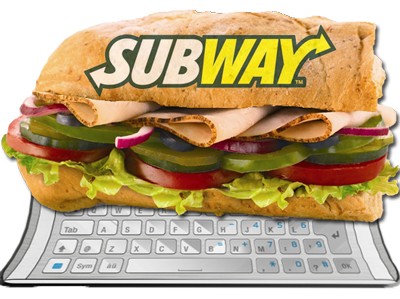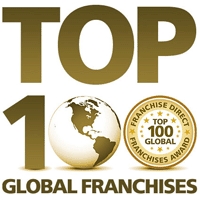
Article Contributed by GlobalBX.com
Every year, Entrepreneur magazine names its top franchises for sale, gathered up into a list called the “Franchise 500.” By referring to this list, prospective franchise owners can determine the top franchise for sale in any number of categories—the best fast-food franchise, the best auto service franchise, the best do-it-yourself picture framing franchise, and so on. This publication also names the 10 best franchises for sale regardless of the industry they are in, and it is this list that offers the most coveted ranking of all. The “next hottest franchise concept” certainly has a chance to advance in the standings. But year after year, the same companies continue to dominate this list, mainly because they have superb brand recognition, a solid financial base, highly satisfied franchisees committed to excellence, and products or services that have stood the test of time. As Entrepreneur sees it, here are the top 10 franchise companies for 2009.
1. Subway
The top company on this list has gained a reputation for offering fresh, healthy food at very reasonable prices. They also come up with some very innovative national marketing campaigns to keep the name “fresh” in the public’s eye. Subway began franchising in 1974 and has more than 21,000 franchises in the United States. The company charges a franchise fee of $15,000, with ongoing royalties of eight percent based on gross annual sales. One’s total investment will run from between $78,000 and $238,000. Subway has franchises for sale in nearly every U.S. state.
2. McDonald’s
Ray Kroc took a California hamburger joint owned by two brothers and turned it into the world’s largest fast-food restaurant chain. Over the years, McDonald’s has been an innovator from the aspects of both service and menu items, inventing such concepts as the kids’ meal and drink tops with pre-punched access holes. The company charges a franchise fee of $45,000, with ongoing royalties of 12.5 percent based on gross annual sales. One’s total investment will run from between $950,000 and $1.8 million. McDonald’s has a franchise for sale to residents of every U.S. state, plus worldwide opportunities exist as well.
3. Liberty Tax Service
With the tax deadline of April 15 looming over the heads of U.S. citizens every year, more and more taxpayers realize that it pays to hire an outside expert to help them complete their filings. The company started as Jackson Hewitt Tax Service in 1972 (and began franchising a year later) and changed its name after buying out another tax business in Canada. The company charges a franchise fee of $40,000, with variable ongoing royalties based on gross annual sales. One’s total investment will run from between $56,000 and $70,000. Liberty Tax Service has franchises for sale to anyone living in the U.S. or Canada.
4. Sonic Drive-In Restaurants
This company started as a root beer stand in 1954 in Shawnee, Oklahoma, jumping into the franchise business five years later. Today there are close to 3,000 Sonic Drive-In franchises across the country. The company charges a franchise fee of $45,000, with ongoing royalties ranging from two percent to five percent, based on gross annual sales. One’s total investment will run from between $1.2 million and $3.2 million. Sonic currently seeks out residents of Canada, New Zealand and Australia, offering exclusive territories in its franchise for sale.
5. InterContinental Hotels Group
The flagship property in this massive chain is the self-named InterContinental, which include some of the most prestigious hotels in such world capitals as London, Paris, Vienna, Cairo, Nairobi, and many others. This hotel conglomerate also includes such familiar brand names as Holiday Inn, Crown Plaza, Staybridge, and Candlewood. There are more than 2,600 franchises in the U.S. alone, as well as another 800-plus in foreign countries. Franchise fees and total investments will vary widely, since every property is unique. The company charges an ongoing royalty of five percent based on gross annual sales. InterContinental has franchises for sale in Oregon as well as assorted worldwide locations.
6. Ace Hardware Corp.
The neighborhood hardware store is alive and well in the guise of Ace, a national chain that prides itself on hometown values and helpful personnel who can tell you the best way to paint a door or repair a fence. The company began in 1924 and became a franchise operation in 1976. There are currently more than 4,200 U.S. franchises. The company charges an application fee of $5,000, and one’s total investment will run from between $400,000 and $1.1 million. Ace Hardware has franchise for sale opportunities in all U.S. states.
7. Pizza Hut
In 1957, when this pizza chain started business as a single restaurant in Wichita, Kansas, no one would have suspected that it would grow into the largest pizza restaurant chain in the world. Today there are nearly 10,000 franchises in existence, including “express” and kiosk locations that expose Pizza Hut products to more people than ever. The company charges a franchise fee of $25,000, with ongoing royalties of six percent based on gross annual sales. One’s total investment will run from between $317,000 and $2.9 million. Pizza Hut has franchises for sale in Oregon as well as assorted worldwide locations.
8. The UPS Store / Mail Boxes Etc.
Mail Boxes Etc. started in 1980 as a competitor to the U.S. Mail and has since expanded to offer all kinds of services that include the sale of packing materials, copying and printing, mailbox rentals, and shipments of darned near anything to anybody who has a permanent address. Re-branded as The UPS Store – although it ships by other carriers as well – the company charges a franchise fee of $30,000, with ongoing royalties of five percent based on gross annual sales. One’s total investment will run from between $155,000 and $295,000. The UPS Store has franchise for sale opportunities in all U.S. states, plus various locations worldwide.
9. Circle K
This convenience store chain was founded in 1951 in El Paso, Texas. They waited until 1995 to begin franchising, but since then Circle K has seen its U.S. franchises grow to more than 450. Surprisingly there are nearly 3,700 franchises overseas. The company charges a franchise fee of $15,000, with ongoing royalties of four percent based on gross annual sales. One’s total investment will run from between $161,000 and $1.4 million. In a nationwide expansion mode, Circle K has franchises for sale across the United States as well as in assorted worldwide locations.
10. Papa John’s International
This pizza chain got its start in 1985 in Jeffersonville, Indiana. Papa John’s has more than 2,100 U.S. franchises and close to 500 on international soil. The company charges a franchise fee of $25,000, with ongoing royalties of five percent based on gross annual sales. One’s total investment will run from between $135,000 and $490,000. Papa John’s has franchise for sale opportunities in all U.S. states.
About the Author
Thinking of starting a business or buying a franchise for sale? GlobalBX.com provides a FREE business for sale exchange with over 32,000 businesses and franchises for sale. Get FREE information on all the top franchises today!
Category: Franchise
Article contributed by Franchise Direct
Franchise Direct, one of the world’s top franchise portals, has released its first-annual list of the Top 100 Global Franchises. Franchise Direct arrived at these rankings after examining thousands of franchises worldwide. Franchising plays a major role in the global economy, and this list highlights the franchise businesses that have best-invested in international development. Combined, they make up some of the world’s most best and beloved franchised brands.
Franchise Direct is perfectly positioned to examine the global franchise market, as it is a prominent player in international franchising and operates popular national portals in seven major economies in North America and Europe. Their exclusive study has wider ramifications for the franchising industry. The list was compiled according to an objective methodology that factored in a range of commercial matters alongside issues of corporate citizenship and best practice. Franchise Direct examined each franchise’s units, revenue and market position. It also weighed in its support and financing for franchisees, as well as its policy regarding environmental and social matters to arrive at its list of the Top 100 Global Franchises.
The Top 100 Global Franchises provide an insightful glimpse inside the state of the franchising industry in the current economic climate. For instance, the Top 100 is largely dominated by the top performers in the quick-service restaurant industry, with McDonald’s and Subway coming first and second. But the list also shows the diversity of the franchising system, with cleaning, internet and senior care franchises represented in the Top 100.
Franchising is seen by many as an American concept, but these rankings are also unique because they indicate the rising success of franchises outside of America. Fifteen franchises that are not based in America have cracked the Top 100, with franchises from Japan, Australia and Britain represented.
This list provides a blueprint for franchises considering international expansion.
While each franchise on the Top 100 has developed a clear brand identity, they all share a number of similar traits. Each has built its success on a clear business model that’s easy to replicate, a strong support apparatus, an ability to innovate and a sensitivity towards environmental issues..
Franchises are certain to play a greater role in the globalizing economy. Despite the global credit crunch, the world’s top franchises remain cautiously optimistic. This list shows that franchising continues to remain a vibrant economic force in America and beyond.
Evaluating Franchisor Support

You’ve narrowed your search down to three franchises. All of them promise great support. How can you get a better idea of what you’ll really get from each of them?
That’s a great question. One of the main benefits of being in a franchise system is that you don’t have to figure everything out on your own. With a little research, you’ll find a wealth of information about levels of support. That information will help you pick the franchise system that’s right for you.
Before you get started, take a few minutes to think about the word “support” and what that looks and feels like to you. Does it mean someone holding your hand through the pre-opening phase, or does it mean someone handing you a manual and checklist and letting you go? Does it mean an “in-market” support person living in your market, or are you willing to accept less frequent visits from franchisor staff who fly in from a home office? The better you understand what’s important to you, the more likely you are to get it.
Next, check the UFOC for lawsuits, closures, and transfers of existing units. While not a direct indicator of level and quality of support, they can at least serve as an early warning system. If a company has high levels of lawsuits or closures, it’s a good indicator that you’ll want to look at everything a bit more closely – including support.
Then, review the list below to determine which items are most important to you. Once you’ve reviewed the list, start talking with the prospective franchisors and their existing franchisees. The more people you can talk to, the better. Also, look for support information in writing. Does the franchisor have manuals for training you? For training your employees? How often are they updated? Do people use them? If not, why not?
Remember that no franchise system is going to have everything. A young franchisor will often have fewer of these, and that’s why it may cost less to get into their system. A more mature franchisor will often have more of these, and that’s why it may cost more to get into their system. Here’s the list:
Protection of Intellectual Property
* Trademarks and copyrights
* Willingness and ability to protect intellectual property from infringement
Real Estate
* Verification of suitability of potential locations
* Preparation of construction documents
* Preparation of signage construction documents
* Relationships with contractors
* Lease negotiation
* Construction oversight
* Discounted pricing on materials
* Checklists to help keep you on track
Purchasing and Distribution
* Vendor screening
* Vendor negotiations
* Vendor management
* Getting the product to you
* Getting it to you at a cheaper price than you could on your own
Marketing
* Clear, intelligent marketing and advertising plan
* Branded marketing and advertising materials
* Ability to produce custom materials for you if needed; how much does it cost, and how long does it take?
* Development of a marketing plan for your business
* Guidance to help you maximize your return on investment on marketing dollars
* Grand opening support
* Regularly-scheduled marketing coaching
* Discounted pricing for media and printing
* Advertising cooperatives
Operating Systems
* Outlines the standard procedures for running your business. Usually in manual form.
Training Systems
* Initial training at the franchisor’s training location how long? How good will you be when you’re done?
* Ongoing pre-opening training; does the franchisor have pre-approved training locations, either franchisee or company-owned, where you can continue practicing what you learned at your initial training?
* Grand Opening Training; does someone come out to help you make the last push to get your business open? How long do they stay? How long have they been with the company and what is their level of experience?
Business Operations
* Visits from franchisor staff. How often do you see someone? What happens when they come?
* Back office support staff
* Maximizing profitability
* Budgeting and forecasting
* Local, Regional, National, and/or International workshops and conferences
* Trademarks and copyrights
* Willingness and ability to protect intellectual property from infringement
Enforcement of Standards
* How clearly do they communicate standards? Are they written down? Talked about regularly?
* Is there a clear, objective system for measuring compliance to standards?
* How often are standards checked to verify compliance?
* Once a franchisee or vendor is found to be in non-compliance, what action does the franchisor take, and how quickly do they take it?
* Do they leave flexibility for innovation within acceptable guidelines?
This article is contributed by: Franchise Genius
FranchiseGenius.com is the largest, most comprehensive online directory of franchise concepts, with 1,700+ concepts summarized, and includes a franchise resource center full of objective and useful information.

The franchise sales process is kind of a paradox: both sides want the other to like them, to show that they are perfect for each other. At the same time, both the franchisor and the prospect want to make it clear that they’re looking for the perfect partner.
In other words, franchise prospects want to put their best foot forward but make it clear that this is only one of several possible choices and the franchisor wants to impress the potential franchisee, but make it clear that they are very selective in whom they choose to allow into their system.
So what is it that franchisors look for in prospective franchisees? Most franchisors talk of “awarding” franchises, rather than selling them. The difference is that they won’t sell to anyone. You must be someone who values the same things as the franchisor and be financially qualified. The franchisor is taking a risk by letting you into their system – here are some of the things they look for, either through explicit questions or by watching your non-verbal “answers” to situations.
Are you financially qualified?
You don’t have to have a six-figure bank account but you do need to a) show some resources of your own and b) show that you understand how to obtain money to cover franchise fees, start-up costs, and operating capital. You can do this through loans, friends, and partnerships. The last thing a franchisor wants to do is put someone in who doesn’t have enough capital to get over the initial customer ramp-up period. You make the cut if you show you understand how to obtain capital.
Are you self-motivated?
This seems obvious, and most potential franchisees would say that they are successful people who have always been self-motivated. Your house is on the line, after all, so of course you’re motivated to succeed. But this goes more to what happens when things are hectic or there are challenges unique to your area. Franchisors want to know that you’re motivated to seek help within the system (franchisees, business consultants, and other resources) – that you recognize this is your business. The franchisor has many tools and resources for you to use. But it’s up to you to ask for them and to implement them.
Do you have a passion for the product or brand?
Passion overcomes many obstacles. Franchisors want to know that you can be an evangelist of their brand, to promote the products and uphold the trade dress in your market. A passion for the brand indicates a franchisees willingness to overcome challenges, while still keeping the brand’s best interests in mind. Passionate franchisees are generally more successful than others who just “want to be their own boss.”
Do you just want to be your own boss?
Very often, potential franchisees will expound on how they would do things or offer tips as to how to make the system better. These tips are appreciated when they come from existing franchise owners, but most often are red flags during the franchisee selection process. A franchise system is just that – a system. Franchisors need to know that you are willing to work within the system and that you’re not just buying a franchise because you can get open faster and then do whatever you want (it’s your business…right? You can sell magazines and suntan lotion in your sandwich store if you want to…right?).
Good business partnerships are like good marriages and take just about as much work. If you do your research, and are honest during the application and selection processes, your new relationship will have a firm foundation.
If you’re out to impress the franchisor and you oversell yourself, there’s a good probability that neither of you will be happy with the partnership. Find what you love to do, then do it with passion.
This article is contributed by: Franchise Genius
FranchiseGenius.com is the largest, most comprehensive online directory of franchise concepts, with 1,700+ concepts summarized, and includes a franchise resource center full of objective and useful information.

Article contributed by Franchise Direct
Franchise Direct, one of the world’s leading franchise portals, recently conducted an in-depth study of the coffee franchise sector. After thoroughly examining 29 Franchise Disclosure Documents, Franchise Direct has found that the coffee franchise sector is weathering the recession resiliently, bolstered by a product that is an integral part of American life.
Despite an early dip at the beginning of the recession, this $11 billion a year industry continues to grow and diversify, according to the Franchise Direct study. With coffee consumption remaining constant in this declining economic climate, coffee franchises continue to be a worthwhile investment.
According the study, the coffee franchise industry remains extremely competitive at the top and fragmented at the bottom. Starbucks is the industry’s leading coffee chain, with over 16,000 stores worldwide. Because of the accessibility and popularity of coffee, a franchised approach, boosted by an established brand identity, continues to be one of the most profitable options to profit on this product.
One of the most reassuring reasons to invest in a coffee franchise is the enduring success of the beverage. The Franchise Direct study quotes a recent poll that shows that coffee consumption actually increased last year among the lucrative 25-to-39-year old demographic, while it remained steady amongst 40-to-59-year-old’s. As the recession continues, we can safely assume that the popularity of coffee will continue unabated.
Coffee franchise businesses are also flexibly adapting to new American consumer habits. For instance, in recent years, there has been greater demand for environmentally-friendly products that do not exploit workers in the production process. Coffee franchises have been at the cutting edge of the Fair Trade movement, and with a range of organic goods, they are perfectly positioned to thrive on this developing $1billion industry.
The Franchise Direct study shows that location is the most important factor in a coffee franchise’s success. At the same time, mobile units or kiosks give prospective franchisees a low-overhead, high footfall alternative to the standard franchise unit arrangement.
Underpinning the recent success of coffee franchises is the growing popular consensus that coffee has a number of health benefits for drinkers. While perhaps once seen as unhealthy, coffee, as illustrated by authoritative studies conducted by researchers at Harvard and UCLA, clearly has health incentives.
People exploring franchises for sale will find that coffee franchises sell a product with broad public appeal that is seamlessly adapting to American consumer trends towards healthiness, social responsibility, and environmental sustainability.
